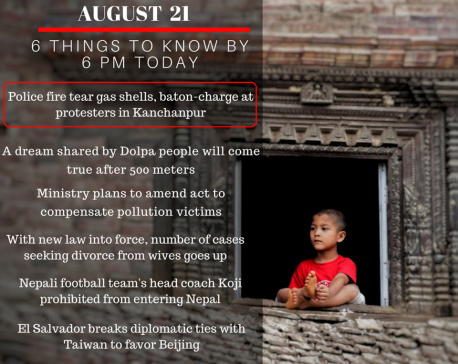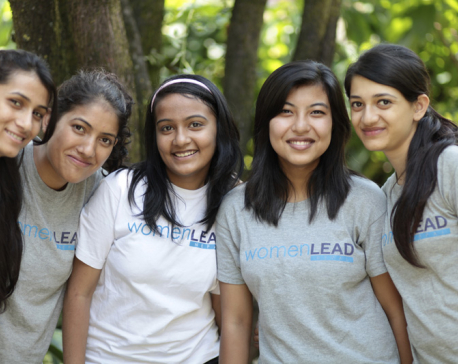
OR
Press council grills editors
Published On: August 18, 2018 06:45 AM NPT By: Republica | @RepublicaNepal
KATHMANDU, Aug 18: In breach of its jurisdiction, the Press Council, which was established to promote healthy, free and accountable journalism, has now started “grilling” editors of daily newspapers.
Usually the Press Council would write to a particular newspaper, if deemed necessary, to discuss any news item published by that paper. But on Friday morning, it summoned the editors of Nagarik daily, its sister publication Republica and the Annapurna Post to discuss about case in the presence of complainants.
Though two of the editors turned up at the council office at Tilganga at 8 am, they were not informed about the agenda of the discussions. Two days ago, an employee of the council had telephoned them to show up at the office at 7 am, Friday. When asked about the agenda of the discussions, the employee said the council wanted to discuss the media code of ethics.
After Editor-in-Chief of Nagarik Guna Raj Luitel told the employee that they could not come at 7 am as they had to work till late night, they were asked to be there at around 8:30 am. On Thursday night also, an official from the council reminded them of the Friday meeting, but without giving any details and declining to disclose names of other participants.
Editor of Annapurna Post Akhanda Bhandari was also not informed about the agenda. As they entered the office, a member of the council, Suvechchhya Bindu Tuladhar, received them.
Council official Surendra Malla informed them that they were called to discuss complaints registered against their newspapers with the complainants.
The council has no history of bringing both sides together to hold hearings on complaints registered with it against any media house. However, if any complaint was registered against a media house, the council would write to the latter, seeking clarification and asking for a correction.
Media houses have been responding to such letters sent from the council. All such letters issued to Nagarik urging it to abide by the media ethics code have been duly honored.
But the way council called in editors for hearings on complaints is seen as “objectionable” by the media fraternity. The council is not a court of law, a police entity or a mediation center to conduct hearings on complaints. Summoning the editors and grilling them is a clear breach of the council’s jurisdiction and undermines the editorial freedom of media.
Anyone who is dissatisfied with any news item published by newspapers can always move the courts if complaints made through the council are not addressed to their satisfaction. Summoning editors and grilling them in this fashion may lead to self-censorship in journalism.
“If both sides come together and discuss about the complaints face-to-face, it becomes easier to resolve the concerns,” said Malla, to which the editors replied, “So, you want us to face the complainants and attack us publicly?”
The move has steered a debate whether it was a coincidence or a planned attempt to initiate action against editors of major dailies right from the day new civil and criminal codes, which try to limit press freedom, came into force. In the past, a veteran in the legal field used to be appointed chairman of the council. But currently an individual who has a journalism background is the chairman. Is someone who himself understands journalism so well trying to limit press freedom and encourage self-censorship?
After the editors maintained that they would not take part in such hearings and demanded that Council Chairman Kishor Shrestha be called, Shrestha informed the editors by phone call that he could not attend the meeting as he was busy with the 45-day rites of his mother’s demise.
As the meeting was summoned without prior information about its agenda, the editors declined participation. The proposed Press Council bill has envisioned the council as a “regulating body”. Is the move to grill the editors a prelude to this regulatory role?
You May Like This

Federalism: learning by doing
Issues have emerged regarding effective implementation of federalism. But there is a long way to go and these issues can... Read More...

Aug 21: 6 things to know by 6 PM
Your daily dose of missed important news of the day. ... Read More...

Helping women re-envision a better Nepal: Women LEAD Nepal
KATHMANDU,March 7: Women LEAD Nepal started as an idea that women and girls could change the trajectory of Nepal’s future and... Read More...







Just In
- NRB to provide collateral-free loans to foreign employment seekers
- NEB to publish Grade 12 results next week
- Body handover begins; Relatives remain dissatisfied with insurance, compensation amount
- NC defers its plan to join Koshi govt
- NRB to review microfinance loan interest rate
- 134 dead in floods and landslides since onset of monsoon this year
- Mahakali Irrigation Project sees only 22 percent physical progress in 18 years
- Singapore now holds world's most powerful passport; Nepal stays at 98th











Leave A Comment